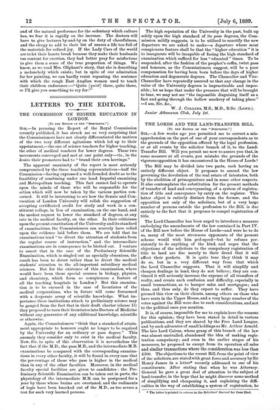LETTERS TO THE EDITOR.
THE COMMISSION ON HIGHER EDUCATION IN LONDON.
[To TEE EDITOR OF THE "SPECTATOR.")
Six,—In perusing the Report of the Royal Commission recently published, it has struck me as very surprising that the Commissioners have not clearly differentiated the motives of the two very different agitations which led up to their appointment,—the one of science teachers for higher teaching, the other of medical teachers for lower degrees. These two movements converged and met at one point only—viz., in the desire their promoters had to "brand their own herrings."
The apparent unanimity of the report is most seriously compromised by the three teaching representatives—half the Commission—having expressed a well-founded doubt as to the feasibility of combining under one head Imperial examining and Metropolitan teaching. This fact cannot fail to operate upon the minds of those who will be responsible for the action which will now be taken by the various parties con- cerned. It will be interesting to see how the Senate and Con- vocation of London University will relish the suggestion of accepting certificated credit for study and work in a con- stituent college, in lieu of examination, on the one hand, and the modest request to lower the standard of degrees, at any rate in the medical faculty, on the other. In their criticisms upon the present constitution of the University and its standard of examinations, the Commissioners can scarcely have relied upon the evidence laid before them. We are told that its examinations tend "to divert the attention of students from the regular course of instruction," and. the intermediate examinations are in consequence to be blotted out. I venture to assert that in the case of the Preliminary Scientific Examination, which is singled out as specially obnoxious, the result has been to direct rather than to divert the medical students' attention to the all-important subsidiary medical sciences. But for the existence of this examination, where would have been those special courses in biology, physics, and chemistry, which form so conspicuous a feature of all the teaching hospitals in London ? But this examina- tion is to be excused in the case of licentiates of the medical corporations, who in future will come forearmed with a desperate array of scientific knowledge. What im- portance these institutions attach to preliminary science may be gauged from the fact that in their draft charter (clause 15) they proposed to turn their licentiates into Doctors of Medicine without any guarantee of any additional knowledge, scientific or otherwise.
Again, the Commissioners "think that a standard of attain- ment appropriate to honours ought no longer to be required by the University for an ordinary or pass degree." This anomaly they consider only to exist in the medical faculty. Now, Sir, in spite of this observation it is nevertheless the fact that if the M.D., the pass M.B., and the intermediate M.B. examinations be compared with the corresponding examina- tions in every other faculty, it will be found in every case that the per-centage of those who pass is higher in the medical than in any of the other faculties. Moreover, in the medical faculty special facilities are given to candidates : the Pre- liminary Scientific Examination can be taken out in parts, the physiology of the intermediate M.B. can be postponed for a year by those whose brains are overtaxed, and the rudiments of logic have been knocked out of the M.D., as too severe a test for such very learned persons. The high reputation of the University in the past, built up solely upon the high standard of its pass degrees, the Com- mission mildly suggests, is to be utilised to sanctify the new departure we are asked to make—a departure whose most conspicuous feature shall be that the "higher education" it is to inaugurate will be incapable of facing the high standard of examination which sufficed for less " educated " times. To be suspended, after the fashion of the prophet's coffin, twixt pass and honours, as the Commissioners suggest, will be a poor compensation for having been born before the days of higher education and degenerate degrees. The Chancellor and Vice- Chancellor have repeatedly assured us that any change in the value of the University degrees is impracticable and impos- sible; let us hope that under the pressure that will be brought to bear, we may not see "the impossible disguising itself as a fact and going through the hollow mockery of taking place." —I am, Sir, &c.,










































 Previous page
Previous page